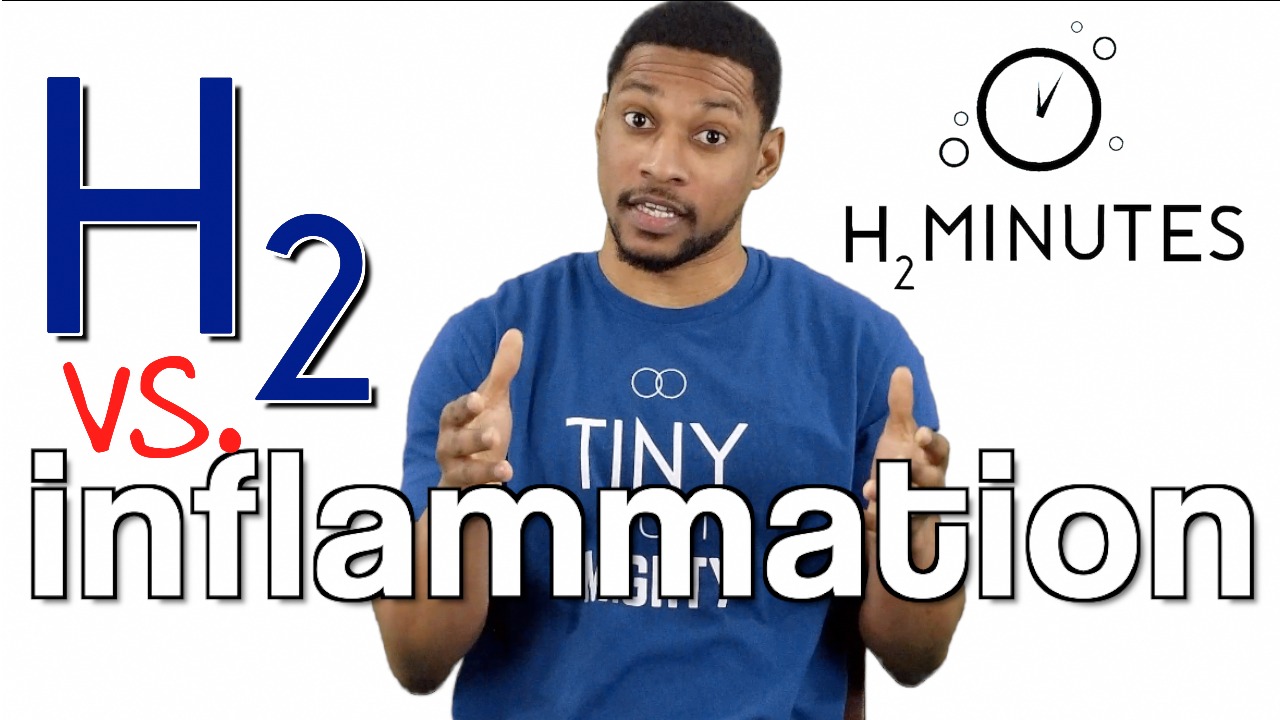During the past week of scouring through my molecular hydrogen database, I ran across an interesting topic. It is interesting because most people are acquainted with it and deal with it daily but might not know much about in depth.
The topic is inflammation. Nowadays inflammation gets a bad rap due to the fact it’s mostly featured in blogs, social media posts, and the media as a bad guy and a precursor to many diseases. While it is true that chronic inflammation has been linked to the pathogenesis of a multitude disease, such as cancer, rheumatoid arthritis, diabetes, neurological disorders, etc. However, inflammation is not something that should be fully eradicated. In fact, inflammation or an inflammatory response is biologically normal and serves many purposes in the human body, including helping to maintain homeostasis. There are plenty of scientific studies demonstrating that molecular hydrogen (via hydrogen-rich water, hydrogen inhalation, etc) may potentially have significant therapeutic effects for inflammatory diseases through the reduction of oxidative stress and inflammation or even preventing excessive inflammation in the first place. Before we begin discussing molecular hydrogen’s benefits against elevated inflammation, let’s define what inflammation is, and how it works!
What is Inflammation? [1][2]
Inflammation is the human body’s immune system response to a stimulus. Inflammation at its core is a protective response to harmful stimuli (pathogens, damaged cells, or irritants) involving immune cells, blood vessels and molecular mediators. The inflammatory response is designed to eliminate the initial cause of cell damage/injury and to get rid of dead cells (necrotic cells). Inflammation also initiates tissue repair.
At the cellular level: A complex biological system[3][4]
When inflammation is initiated there is an increase of blood plasma (a substance that holds cells in the blood) and white blood cells/leukocytes (T cells, mast cells, macrophages) and different types of defense cells into the injury/infected tissue. These cells release a host of different substances into the injury site (proinflammatory cytokines, histamine, hormones, bradykinin, etc). This propagates the body into a mature inflammatory process, leading to dilation of blood vessels and swelling allowing more blood flow to the injury. This is how inflammation can cause injured tissues to become red and hot. The proinflammatory cytokines and histamines can irritate nerve cells and send pain signals to the brain. This is one of the reasons why inflammation can cause pain. As a whole, inflammation brings more fluid into the inflamed area. This is a very simplistic breakdown.
2 Types of Inflammation: Acute, Chronic[5][6]
Acute: Is the body’s natural response to harmful stimuli; may only exist for a few days or few weeks. (explained above)
- Redness
- Heat
- Swelling
- Pain
- Loss of function
Chronic: Is the human body’s immune system making mistakes and attacking healthy tissue/cells. This causes harmful inflammation and leads to having a constant state of inflammation. This can lead to multiple diseases, such as
- Rheumatoid Arthritis (many joints throughout the body are inflamed)
- Atherosclerosis (plaque build up in the artery walls)
- Psoriasis (chronic skin condition)
- Cancer
- Crohn’s disease (Inflammation of the bowel)
H2 can help inflammatory problems[7][8][9]
Signal Modulator
Molecular hydrogen appears to be a novel signaling molecule, which means it can alter or influence cellular signaling pathways. Due to this effect, hydrogen through its most convenient administration methods (hydrogen water, hydrogen inhalation, hydrogen baths, etc) can have a profound effect on inflammation and inflammatory diseases.
Decreases Excessive ROS
H2 (hydrogen gas) has been shown to decrease oxidative stress (ROS in excess), which can aid in the reduction of inflammation. Also, adding additional therapeutic benefits by reducing proinflammatory cytokines (linked to damaging inflammation), up-regulating anti-inflammatory cytokines, as well as anti-allergic effects and gene expression. Molecular hydrogen, because of its signaling functions, can also exert anti-cellular death affects (apoptosis).
Regulates Cytokines
H2 (hydrogen gas) cannot only reduce the production of proinflammatory cytokines in the early and late stages of inflammation, thus reducing inflammation, but it also appears that it can actually block the production of these cytokines via its cellular modulation properties, preventing an excessive elevation of inflammation in the first place. Since hydrogen has an effect on chemokines (a specific type of inflammatory cytokine), it seems that H2 (hydrogen-rich water, hydrogen inhalation, etc) can suppress certain immune responses in various white blood cells. The referenced H2 study shows that H2 drastically improved inflammation and improved blood pressure because of this effect. Researchers have discovered that H2 acts as an anti-inflammatory and anti-allergic regulator, by influencing inflammatory mediators. H2 can decrease the expression of these proinflammatory cytokines (factors), ”TNF-α, IL-6, IL-1β, CCL2 and IL-10, TNF-γ, IL-12, ICAM-1 [85], HMGB-1 [147], NF-κB [148], PGE2, and PGE2 [54]”.
Also, hydrogen-rich water (molecular hydrogen) can increase vital anti-inflammatory cytokines such as, IL10 and IL 22, both of which have been studied and are vital for the human body in many ways and are therapeutic in their own right.
“In the present study, levels of both anti-inflammatory cytokines were higher after HRW pretreatment than in the EtOH feeding group, which suggests that HRW pretreatment protects against chronic EtOH-induced liver injury and sarcopenia by suppressing the pro-inflammatory cytokines TNF-α and IL-6 and inducing the anti-inflammatory cytokines IL-10 and IL-22.” [10]
“Moreover, HRW(hydrogen-rich water) reduced TNF-α and IL-6 levels and increased IL-10 and IL-22 (anti-inflammatory cytokines) levels”[11]
It’s amazing that this simple molecule potentially has a 4 fold effect on inflammation by:
Reducing excessive inflammation through the reduction of oxidative stress
Down-regulating damaging pro-inflammatory cytokines
Up-regulating important anti-inflammatory cytokines
Preventing or prohibiting the elevation of inflammation in the first place.
Since molecular hydrogen or hydrogen water seems to exhibit these profound effects at the fundamental level or the inflammatory response and/or chronic inflammation, molecular hydrogen has the potential to have significant protective effects for organs, tissues, and every cell in the human body. Based on the research thus far hydrogen (via hydrogen water, hydrogen inhalation, etc) has vast therapeutic effects and potential for multiple diseases and inflammatory/autoimmune diseases including, Rheumatoid Arthritis, Atherosclerosis, Psoriasis, Cancer, Crohn’s disease, Type 1/2 diabetes, Alzheimer’s, Parkinson’s disease, etc.
Check out our H2Minutes video that discusses the information in this article!

